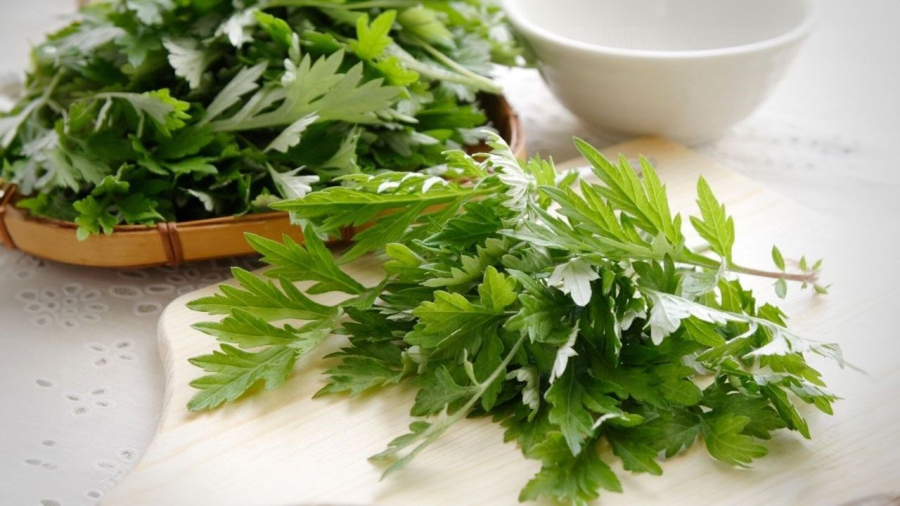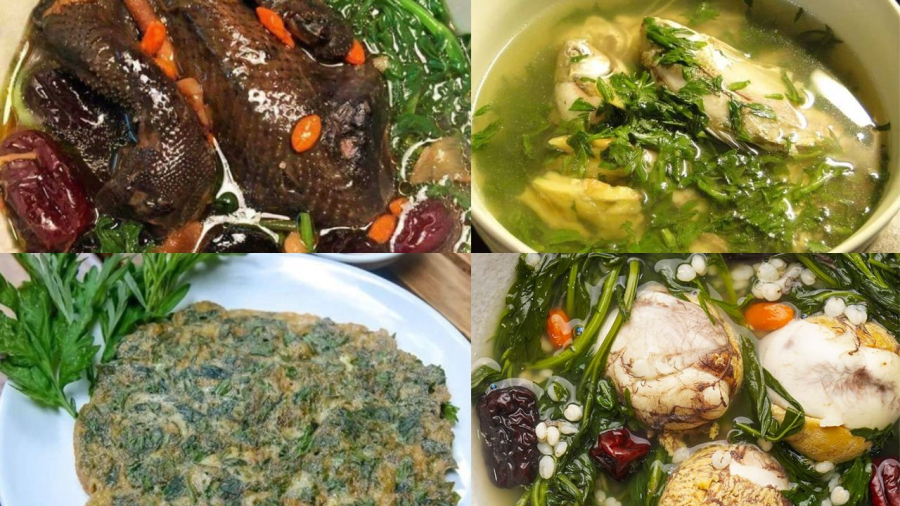Mugwort, a commonly found wild herb, possesses remarkable medicinal properties lauded by traditional Eastern medicine. Its bitter taste deters pests, making it an ideal herb for natural remedies. Mugwort’s therapeutic effects include warming the uterus, stopping hemorrhages, easing childbirth, dispelling cold, and alleviating pain.
Modern scientific analysis reveals that mugwort contains 0.20 – 0.34% essential oil, composed primarily of monoterpenes, dehydromatricaria ester, tetradecatrilin, tricosanol, aracholalcol, and sesquiterpenes.

Bitter mugwort offers numerous health benefits
Therapeutic Applications of Mugwort
Enhancing Skin Health
Soaking feet in mugwort tea improves blood circulation. It releases cold energy from the body, resulting in a rosy complexion. Additionally, applying mugwort tea to the face can combat acne, eczema, and other skin conditions due to its tannin content. Mugwort can also cleanse oily skin and maintain its moisture levels, whether consumed or applied topically.
Supporting Digestive Health
Mugwort aids digestion by improving the function of the liver, gallbladder, and intestines. It promotes bile secretion, supporting liver function and enhancing digestion. Additionally, mugwort alleviates constipation and indigestion. For these benefits, it can be incorporated into dishes such as mugwort and crucian carp soup.

Versatile mugwort can be incorporated into various dishes
Regulating Menstrual Cycles
Traditional Eastern medicine utilizes mugwort to address irregular menstruation and cold extremities in women. Dried mugwort can be brewed as a tea to warm the uterus and enhance reproductive health.
Alleviating Musculoskeletal Pain
Many women experience postpartum bone and joint pain. Bathing in mugwort water can alleviate these symptoms. Using 50 grams of dried mugwort and a few slices of ginger to boil water for bathing or foot soaking can improve blood circulation, warm the meridians, dispel wind and cold, and reduce pain. Postpartum women are prone to wind and cold, so regular mugwort baths are recommended.
Treating Dandruff, Itchiness, and Insomnia
Mugwort’s anti-inflammatory properties make it effective in treating itchy scalp and dandruff. Initially, wash your hair with mugwort water three times per week. Once the scalp heals, reduce the frequency to once or twice per week. This method promotes hair growth and reduces itchiness. Additionally, mugwort water can relax and soothe the circulatory system, promoting restful sleep.
Treating Athlete’s Foot and Edema
Mugwort leaves possess antiseptic and anti-inflammatory properties. Regularly soaking feet in mugwort water inhibits the growth of bacteria, preventing athlete’s foot and reducing edema.
Promoting Blood Clotting
Due to its anti-inflammatory and hemostatic properties, mugwort can stop external bleeding, vomiting of blood, and uterine bleeding. Crushed mugwort leaves can be applied directly to wounds to promote clotting.
Relieving Physical Weakness
Mugwort is traditionally renowned as a potent tonic. It can be combined with lotus seeds, red dates, and black-boned chicken to create a nourishing dish that invigorates blood circulation, stimulates appetite, and combats weakness in individuals recovering from illness or prolonged ailments. Mugwort and crucian carp soup also provides nutritional support and alleviates fatigue.
Improving Blood Circulation and Vertigo
Mugwort can address dizziness, poor blood circulation, and vertigo. Options include scrambled eggs with mugwort or mugwort soup.
Repelling Mosquitoes
Mugwort effectively repels mosquitoes. Dry and burn mugwort in an incense burner. The smoke will deter mosquitoes from entering your home. Alternatively, mop floors with mugwort water and place fresh mugwort plants in corners or near your bed to repel insects.
Precautions for Mugwort Use
Mugwort is available in white and purple varieties, with white mugwort being more common. Both types offer similar benefits, although white mugwort is typically easier to consume. Utilize various methods to incorporate mugwort into your diet. Avoid excessive consumption of scrambled eggs with mugwort, as excessive egg intake can be detrimental to health. Alternative options include mugwort soup with minced meat, chicken bone broth, or hot pot.
When brewing mugwort tea, use 3-5g of dried mugwort (or 9-15g fresh mugwort) per serving. Use in cycles, and discontinue use once symptoms resolve. Avoid prolonged continuous usage.
Individuals with kidney disease, hepatitis, early pregnancy, or acute intestinal disorders should exercise caution and limit mugwort intake.





































